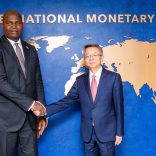IMF mission to visit Mozambique in November
Mozambique: Foreign exchange sales between banks plunged 67% last year

File photo: Reuters
Foreign exchange sales between Mozambican banks plunged 67% in 2024 compared to 2023, to US$44.46 million, but banks managed to buy more foreign currency from customers than they sold to them.
According to data compiled by Lusa from a recently approved annual report by the Bank of Mozambique, banks sold foreign exchange worth US$135.1 million among themselves in 2023.
Since last year, businesspeople across various sectors have complained of difficulties accessing foreign currency through banks, a situation they say continues in 2025 and which they claim hinders imports.
In 2024, through the same interbank channel, the Bank of Mozambique reports that it did not sell foreign currency, while in 2023 it sold US$481.4 million, including all foreign currencies transacted, converted into US dollars.
“The Bank of Mozambique maintained neutrality in the Interbank Foreign Exchange Market in a scenario of exchange rate stability,” the document reads.
Furthermore, the document points out that in 2024, “commercial banks’ purchases from their customers exceeded sales by US$880.16 million”, and that when compared to 2023, “purchases and sales decreased by 4% and 17%, respectively”.
“Thus, in 2024, the total business volume in this segment was approximately US$15.89 million, a 6% reduction compared to the previous year,” it concludes.
The governor of the Bank of Mozambique, Rogério Zandamela, had acknowledged on May 30 of this year that the country witnessed a “dollarization” of the economy at the end of 2024, following the post-election crisis, particularly in the attempt to withdraw foreign currency from banks.
“Today, looking historically—at the time it wasn’t clear what that was—January was certainly the most difficult period – I would say from the end of the year, December, January. Then things calmed down,” the governor said, responding to reporters at the end of the Monetary Policy Committee (CPMO) meeting in Maputo.
Zandamela specifically questioned the guarantee he made at the end of March of sufficient liquidity in the foreign exchange market, when businesspeople complained about the lack of access to foreign currency for imports. The central bank adopted regulations to facilitate the process the following month.
According to the governor, the position resulted from the assessment made up until then, which later revealed the market’s attempt to “shield itself with the dollarization of financial and non-financial assets”.
“This is not uncommon. When there’s a crisis—let’s be honest—it’s also a problem of confidence. When confidence is shaken, you saw the international travel during that period, you saw many people leaving the country. Some lost confidence in the country, some wanted to sell everything they had and leave: ‘Does our country have a future or not?’ This pressure isn’t surprising; it happened. But no one said what they were doing, and they weren’t going to say anything,” he stated at the time.
“This pressure [for access to foreign currency] did exist, and it was very strong. And the banks played a role (…) the banks know their customers,” he insisted.
Mozambique experienced its most difficult post-election period since the general elections of October 9, 2024, with demonstrations, strikes, looting, and the destruction of businesses and public institutions as a way of contesting the results. Clashes with the police also left around 400 dead, according to organizations on the ground.
The violence ceased after a meeting on March 23 between presidential candidate Venâncio Mondlane, who does not recognize the election results and called for protests, and Mozambican President Daniel Chapo, who took office on January 15, during which both agreed to attempt to end violence in the country.












Leave a Reply
Be the First to Comment!
You must be logged in to post a comment.
You must be logged in to post a comment.